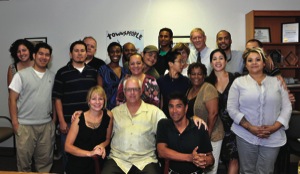
San Diego is missing the most important non-medical component of HIV/AIDS prevention, according to a local housing advocate, and, he says, the result is unnecessary death and illness from the disease.
Tom McSorley is director of development at Townspeople, a housing program for the city’s most vulnerable residents – especially for homeless people who are HIV-positive or living with AIDS. According to McSorley, Townspeople is regularly shunned when HIV/AIDS fundraising organizations pass out money for treatment, education and prevention.
“The problem with that is in 2007 the Centers for Disease Control (CDC) released a report that identified housing as the No. 1 means of preventing the spread of HIV/AIDS,” McSorley said.
Having been in existence for 25 years, Townspeople gets a financial cold shoulder from more than one member organization of the San Diego HIV/AIDS Funding Collaborative. Yet the nonprofit group manages to meet the needs of a continuously growing number of clients. It is able to do so without help from organizations and events such as San Diego AIDS Walk. That ability to survive without access to funding other groups do have access to, comes thanks to private donations from corporations and other organizations, as well as grants and redevelopment money from the city.
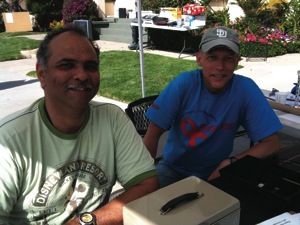
“There are many reasons we aren’t getting a share of the pot,” McSorley said. “Part of the reason has to do with facing reality – not everyone wants to talk about the real ways to prevent HIV/AIDS, because it’s graphic and sexual in nature. We do.”
Being director of development at Townspeople means McSorley is responsible for raising money, basic operating expenses and for capital to buy more properties. In the 1990s McSorley left a prestigious job at one of the nation’s most admired PBS stations – Maryland Public Television, where he was vice president and chief fundraising executive.
“It was a response to the experience of losing too many friends to count, and an expansion of several years of participation, all on a volunteer basis, in HIV/AIDS activism,” McSorley said.
McSorley sees World AIDS Day 2011 as an opportune moment to dissipate some of the “happy talk,” he believes is coming from leaders in the HIV/AIDS treatment and prevention establishment.
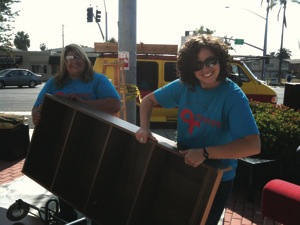
“I think there’s a lot of nice, polite talk that has taken over the conversation,” he told San Diego LGBT Weekly during a recent interview. “You don’t hear much frank talk about the actual causes of the spread of AIDS in the board rooms and meeting places of all the various government agencies or private foundations or funding organizations these days. I fear we’re going backward.”
McSorley laments discussions such as one with a board member of an organization he declined to name saying HIV/AIDS service providers need to include other illnesses in their treatment and prevention portfolios – illnesses such as cancer and Alzheimer’s Disease.
“I was struck silent by that statement,” McSorley said. “I mean, what can you say to that?”
According to McSorley, 50 percent of those who know they are HIV-positive won’t tell their sex partners.
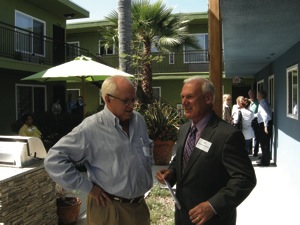
“Twenty-five to thirty percent of people are not telling anyone they’re positive because of fear,” he said. “They’re afraid because there is still a stigma, and because in 34 states – including California – transmitting the virus is illegal; and in some it’s a criminal act.”
Another reason has to do with anonymity.
“When we had anonymous testing we had a higher testing rate – more people would get tested, especially younger people,” he said.
But even when they know their status and are even willing to share that information, some find themselves alone without medical care.
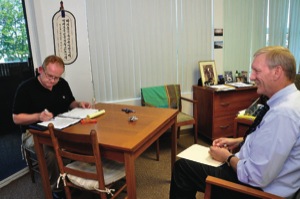
“When you get sick, you might lose your job,” explained McSorley. “You may lose your home. When you are homeless you can’t get to the doctor; you can’t get meds. Plus there are behavioral risks that go hand-in-hand with homelessness – especially with gay, bi, lesbian and transgender people, who are often taken advantage of by predators.”
Yet, says McSorley, not everyone is on board with providing housing to HIV-positive people and people living with AIDS.
“I was told by Jeff Cowden, the chair of the San Diego HIV/AIDS Funding Collaborative that ‘we would never fund housing,’” he said. “Something’s terribly wrong when we have hundreds of people with AIDS living on the streets of San Diego, while at the same time we have the largest private pot of funding, and we’re being told we’re not even part of the discussion; don’t even apply.”
However, the San Diego Human Dignity Foundation, an umbrella organization under which the San Diego HIV Funding Collaborative (SDHFC) falls, says every HIV/AIDS service organization can apply for the funding the collaborative controls.
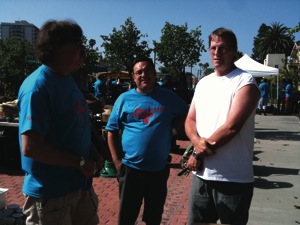
“(SDHFC) issues an open request for proposals) in August of each year,” said executive director, Tom Freeman. “It is an open process and all qualified agencies are encouraged to apply. All applications are reviewed by an allocations committee made up of concerned community members and their recommendations are then forwarded to the HIV Funding Collaborative Advisory Committee for review. The Advisory Committee then sends their recommendations to the San Diego Human Dignity Foundation board of directors for final approval.”
Neither AIDS Walk, nor the HIV/AIDS Funding Collaborative had responded to our requests for comment at the time the newsmagazine went to press.
The bulk of Townspeople’s $1.6 million budget comes from developer fees and private donations. The organization recently acquired a third property, which it has rehabilitated and opened to homeless people living with HIV/AIDS and others with special needs. The Normal Heights address includes 34 one and two-bedroom apartments and boasts rents formerly homeless tenants can afford, as well as an array of support programs aimed at making residents safe from exploitation of all kinds. The organization’s other two properties are in City Heights and Hillcrest.











I call and call and call and nobody at towns people ever answer the phone
I am homeless so even if I leave a message, they cant call me back
are they closed now?